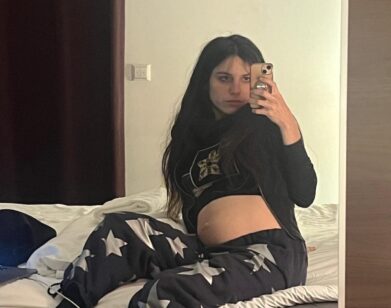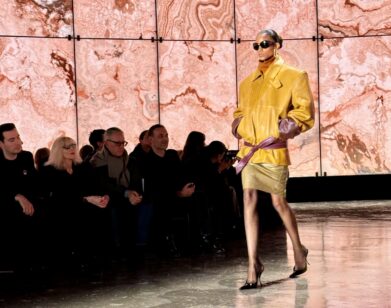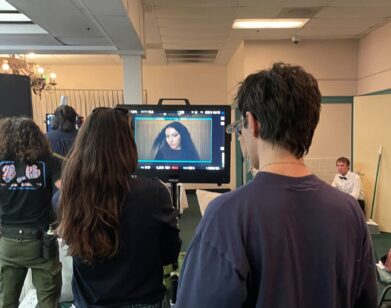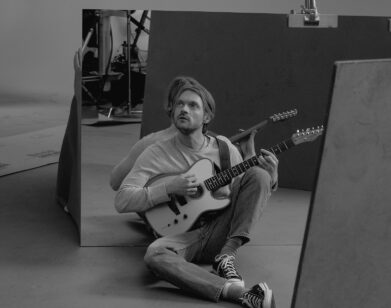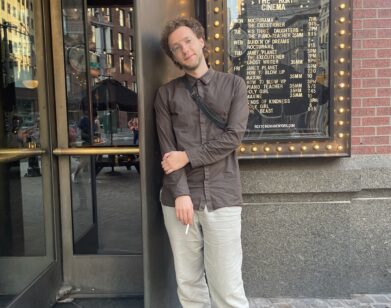Brooke Candy Tells Mykki Blanco Sexorcism is A Big “Fuck You” to Everyone Who Didn’t Believe in Her
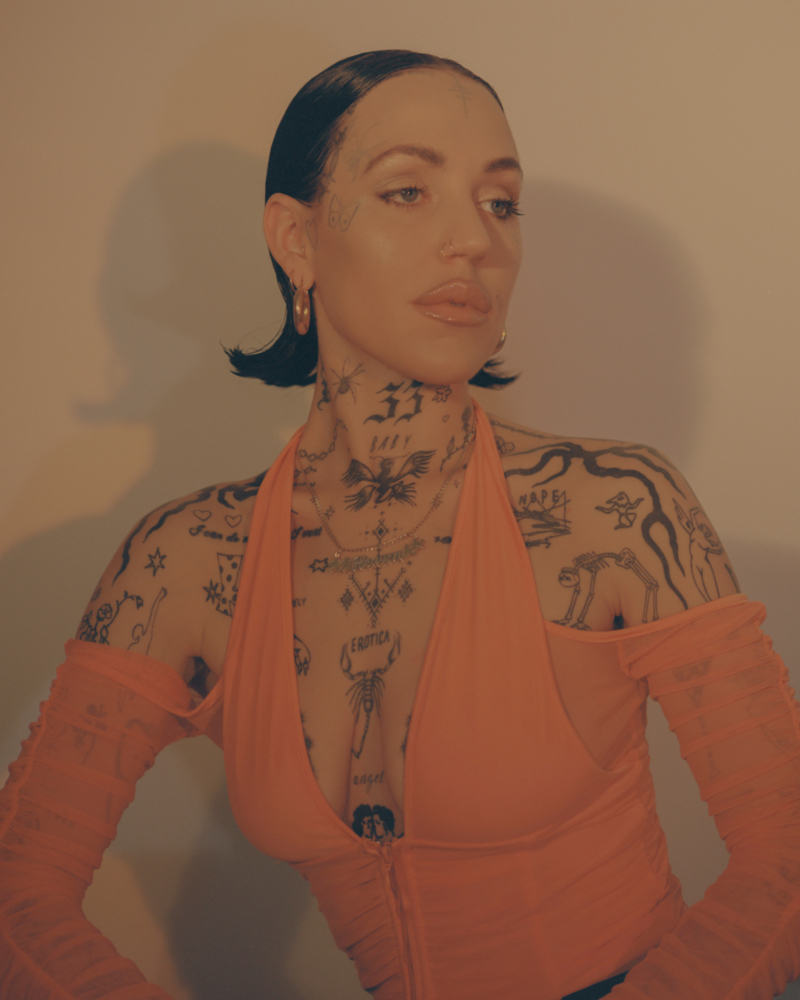
Photos by Natalia Mantini.
Ever heard of that old saying that goes something like, “If you do what you love, you’ll never work a day in your life”? Well it turns out that in order to actually do what you love, you need to put in a lot of work, and the singer slash rapper slash sex symbol Brooke Candy is the very proof. It’s not that Candy always dreamt of becoming a singer/rapper; it all sort of happened by accident. After a not-so-successful coming out during a heated argument with her mother, Candy found herself homeless as a teenager and sought refuge with her friends, through which she entered the San Francisco punk scene as an aspiring photographer. It wasn’t long before she stumbled into music with her now emblematic song “Das Me” in 2012, then appearing in a subsequent cameo in the music video for Grimes’s “Genesis.” Ever since, Candy has amounted a loyal and fierce fan base. Her collaborations with indie music darlings like Charli XCX, CupcaKKe, and Big Freedia, coupled with her presence in the queer nightlife scene, have cemented Candy as a leading force in pop music without ever having released a full-length album—that is, until the arrival of Sexorcism earlier this year.
Candy’s first album is a sort of homecoming for the sex-positive icon. Sexorcism, which features appearances from Rico Nasty, Erika Jayne, Aquaria, and Violet Chachki, among others, talks openly about making money, pussy, “fucking everyday like it’s a shore,” and channeling one’s inner badass baller. Freeing herself of the confines of genre, she released the album under NUXXE, a self-described collective and record label founded on the group’s rejection to genre categorization in the industry. Ahead of her performance at Holy Mountain: Witches Sabbath, Ladyfag’s party taking place at Avant Gardner in Brooklyn this Friday night, Candy got on the phone with her long time friend and muse—the rapper, performance artist, poet, and activist Mykki Blanco—to discuss their journey in the music industry, Candy’s “unexpected and bizarre” wedding, and their plans for the next decade, which may or may not include world domination.
———
MYKKI BLANCO: Hi, how are you?
CANDY: Oh, hey! I’m so excited. Mykki, I stan you.
BLANCO: There’s a Facebook album where I literally just found old photos of Brooke and I. I was just looking at it half an hour ago.
CANDY: Mykki, do you remember when we did the freestyle rapping in Harlem against a fence? We were pretending to be dead and then we’d come to and spit a verse.
BLANCO: I remember this, and I actually have a photo of you, Robot, Princess Nokia, and Wiki that I have on my Instagram. I think when I first met you you were in San Francisco. You were a photographer and you were taking photos for Vice. We hung out that day, took some photos, and smoked weed. What was your life like then?
CANDY: I really, really wanted to be a photographer. I shot you for Vice. I also shot Venus. I remember during that time there were so many amazing artists in San Francisco. Sandy Kim was there and I thought she was so cool. Do you remember that band Girls?
BLANCO: Yeah I do.
CANDY: Now Silicon Valley dominates and it’s turned into something else, but when I was there it felt like it was the final days of this weird utopia for young artists. I was just crazy and wild and much more introverted. I never planned on making music. I was like ‘I want to be the next Nan Goldin,’ and then somehow became a rapper.
BLANCO: I remember we went to a drag club, a place called Aunt Charlie’s.
CANDY: My favorite club!
BLANCO: Sam Banks was there and we watched Boychild. When did you really transition from photography and start thinking about music?
CANDY: I had moved back from San Francisco and was staying with my mom in L.A. It wasn’t the best environment to be in. We were fighting one day and I just blurted out “I’m gay” and then she was like “Get the fuck out of my house.” I ended up being pretty homeless for a second. I was living on friends’ couches. Seth Pratt would let me stay with him on occasion. Seth and I started to make rap songs together just for fun and then it spiraled into something that felt really cathartic for me. I had nothing to lose, and also the trauma of coming out sent me into this space where I felt like I needed to adopt a new identity. Everything I had done was rejected by my mother, and that’s such a hard thing for a young girl.
BLANCO: I guess this stuff from the past is important for me to even bring up because a lot of people we know in this industry have images that are these contrived composites. People have a tendency to go back and romanticize or mythologize their origins, or completely make them up. One thing that I’ve always really respected about you is that you don’t make up your past and you don’t hide anything. When I first met you, you were so punk. How did you come into hip-hop?
CANDY: I was honestly inspired by you and the whole underground ghetto gothic scene. I was in L.A. and so I couldn’t experience it, but I was watching it from afar on Tumblr and Facebook, and I wanted to be a part of it. Everything in my life, I’m like “How did this happen?” I just steamrolled into this space.
BLANCO: I know that you’re someone who was huge on Tumblr and social media networks.
CANDY: Remember I had that blog where I posted all my photos?
BLANCO: Bloody Guts, aah! My God, I forgot all about Bloody Guts. I feel like it’s important for your fans to understand your journey. What was the music like before Everybody Does? For me, I use the word “global” because it really first global Brooke Candy moment.
CANDY: Before Everybody Does, it was garbage. No, it was more experimental. We were making music on MacBooks. I think Dazed & Confused gave me $600 to shoot a video. It was literally fucking crazy, but I think that video is the best video that I’ve ever made. It wasn’t me, it was the people around me that helped me become more evolved as a musician and visual artist, too.
BLANCO: It was really cool to do shows in the beginning because you could party all the time because nobody was younger than you. All the fans were super young. I remember, honestly, every single country I would go to in Europe and South America people would be like, “Are you friends with Brooke Candy?” I’d be like, “Yeah, I am.” And they would be like, especially in Latin countries, “Oh my God, we love her!” It was through these experiences that I was like “Oh shit, does Brooke even realize she’s a huge international success?”
CANDY: I was just playing one-off shows. I wasn’t planning in that way of, “I should do a tour, I should put together an EP or an album.” I was self-managed for such a long time and continue to go in and out of that. I was hustling, like that one time how we talked about we went to Parsons.
BLANCO: Oh, yeah, yeah, yeah.
CANDY: I had done the Grimes thing and had put out maybe one video or a freestyle on the stoop with Mela Murder. We went to that computer lab, ripping it, sending emails to everyone that we knew. That was the vibe then.
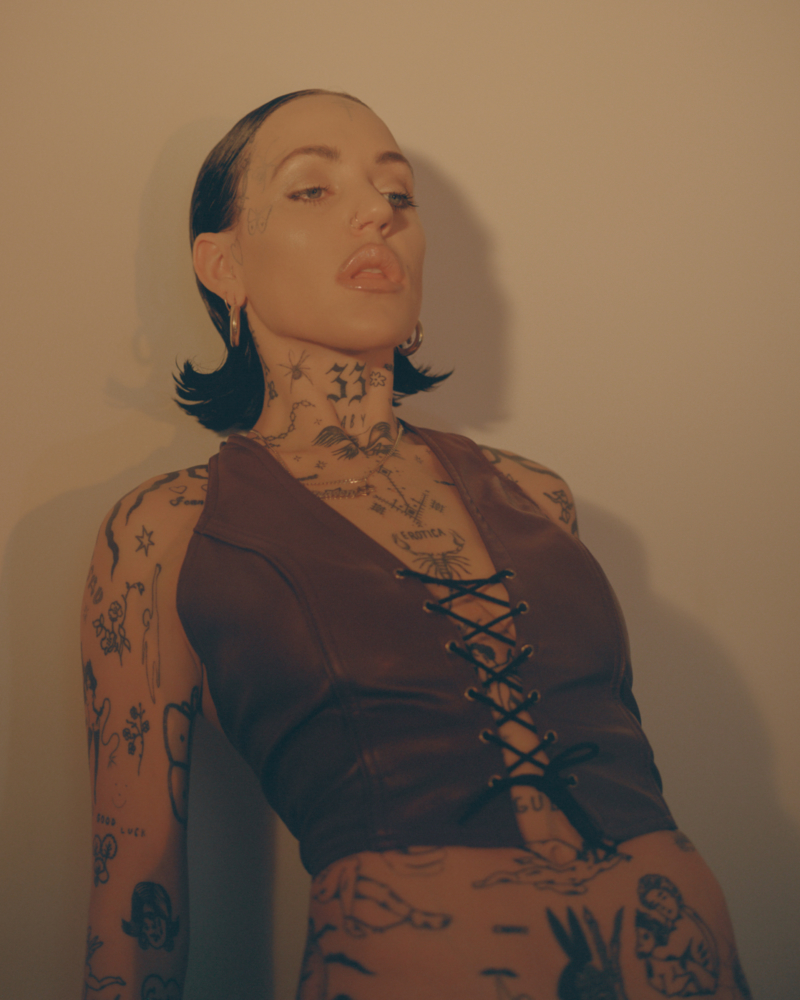
BLANCO: Because I had dropped out, it was Parsons computer lab. I still had access with my school ID. From the outside it seemed as if everything was going really well. There’s a period here where things get really murky for me, before you arrived at this moment leading up to Sexorcism. Can we talk about that? I really want to know what happened.
CANDY: I was making art just to make art because I had to, otherwise I felt unfulfilled and sad. I was already set on this trajectory that I had built and created. I was moving fast on it and was ripped away into this territory that was foreign to me that I didn’t agree with. I was also using drugs, and so it was this perfect storm of being tightly controlled. I was tempted by money and this idea that a major label could help propel me into a space that I thought was grand and amazing and that wasn’t the case at all. I had no idea who I was. I was in a consistent identity crisis. Because of that I was experiencing these episodes of severe, severe depression. I was just around the wrong people and was isolated, in a way, from my friends who made me feel safe. I try not to think about it, but it haunts me, honestly. It’s two or three years of my life that I’m like, “What the fuck?” Those years were so dark. It’s just like “Fuck, I’m 30 and now I’m seeing the light?”
BLANCO: Over years in the industry, we hear this story of young female musicians who come into that experience. How do you think these companies end up sucking the life out of someone and out of their creativity?
CANDY: Whether it’s knowingly done or unknowingly done, it’s just about what this person’s monetary value is and how can we shape them in order to essentially make money for us. It was a game of changing me to fit into a mold that had previously worked. I’m the kind of person who is very hardheaded and it was very hard for me to fit into that mold. Then when it finally happened and I fit into it, it didn’t work because it was so transparent that it was bullshit. I lost sight of my inner strength and who I was as an artist.
BLANCO: When were you able to begin to shed that skin? Because as someone that’s known you for a long time, I would say seeing what was happening in the months or in the year before Sexorcism came, I was just like, “Oh, shit. Respect.”
CANDY: I think the turning point for me was realizing that I had lost interest in the thing that I love the most while simultaneously getting sober. I started to reach out to people that I had been isolated from and had not spoken to or made art with. I wanted to re-engage and see if that was still there and it was. That encouragement snowballed, and then that’s where this album came from. I do feel like I’m back to the place that I was in when I was my 100 percent true, honest self, and never cared who liked it or who didn’t. Making this album was the most cathartic fuck you to everyone who has not believed in the original message or artistry. It reignited me and it gave me back my identity.
BLANCO: When did the songwriting process for Sexorcism begin, and who were some of the producers and collaborators you worked with on the album?
CANDY: I was doing creative direction for a while. I was styling and helping with creative with Lizzo about two years ago. It was before Lizzo blew up. I was like, “She’s going to change the planet.” She was just like me in this way where she was uninhibited, open, and cool. She didn’t give a fuck. Then this new artist who’s blowing up right now, her name is Ashnikko, reached out to me on email and asked if I could help her with some creative. I didn’t have much money at the time, but I spent some money and flew to London. The original idea was to make an EP of two or three songs just so I could get back into the groove of making music. We ended up making a full album in four days because we were like “Fuck it, we don’t care.” There’s no one that we have to impress, and there’s no one that we’re doing this for other than ourselves. It felt exactly like it did in 2012.
BLANCO: Your relationship with Charli XCX always seemed like it’s been a really uplifting thing.
CANDY: 100 percent. She’s had me collaborate over the past couple years. Throughout that time I’d randomly do these things with other artists and every year, Charli reaches out. It’s always something that is outstanding when I’m featured on a track with her and fucking CupcaKKe and Pablo Vittar and Big Freedia. She’s someone who has consistently built me up.
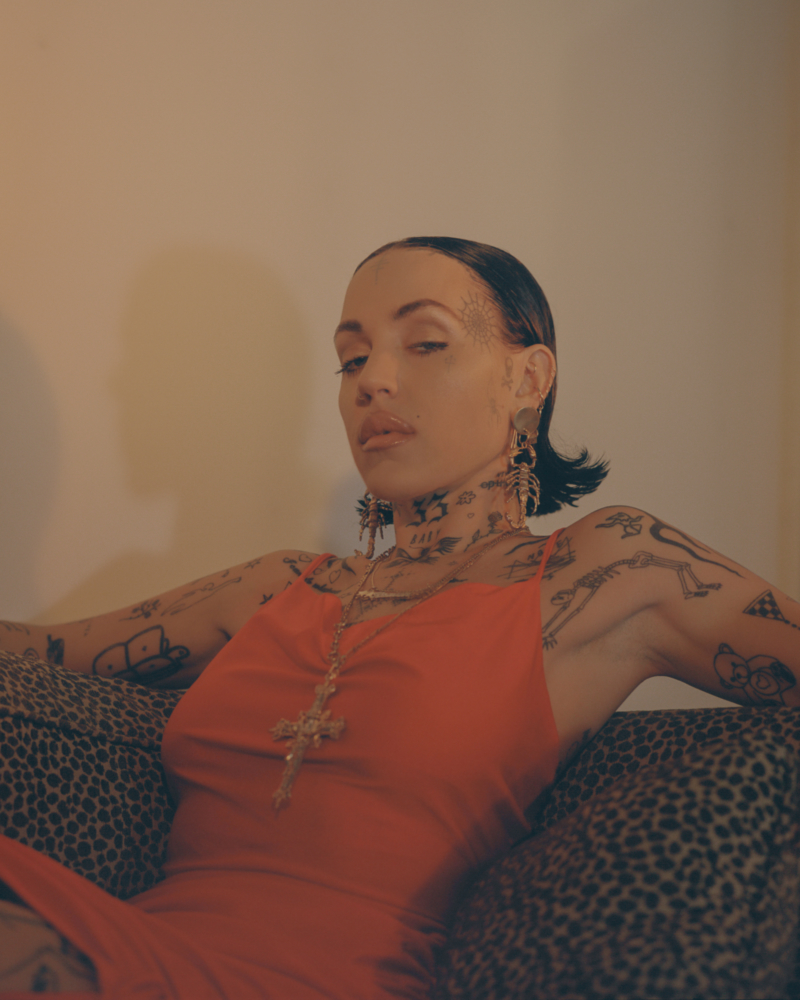
BLANCO: Do you realize to a certain extent now, you are that precursor of a kind of sex-positive female artist?
CANDY: Is that the case? If it is, that’s amazing. I’ve always tried to project sex-positivity and female empowerment and being proud to be queer.
BLANCO: Is it ever challenging to work with people that you care about? Do you ever feel uncomfortable sharing opinions?
CANDY: Never. When I get to work with people that I care about, I’m the most excited. I’m like a fan girl or like a little kid. It’s not scary.
BLANCO: Does your public persona ever put pressure on your romantic life? Because you’re recently married!
CANDY: That’s true, I am. I think my public persona, and tell me if you agree with this, is hyper-sexualized or sex-positive, and I would say that my married life is also hyper-sexualized and sex-positive. It doesn’t put pressure on me because it’s just who I am.
BLANCO: How did you get married?
CANDY: I fell in love really fast.
BLANCO: About a year and a half ago, right? Two years ago?
CANDY: No, just a year ago. We just celebrated the anniversary type thing. Kyle [Candy’s husband] and I were at Seth [Price]’s house. We were staying with him on a mini-vacation and Seth was making costumes for Christina Aguilera for her Las Vegas show. Ding, ding in my head. I was like, “We’re getting married in Vegas.” I remember running into the bedroom and asking Kyle if he wanted to go get married in Vegas. Then we ended up in Vegas going to the chapel where Britney Spears got married and I was wearing white stripper lingerie, stripper heels, and a blonde wig—living the fantasy. He was in leather pants, we were just being silly. We went there and it ended up being that we couldn’t get married because we had to go to the courthouse and get documentation. The next day as we were driving home, Seth was like, “Wait, you know what? I can just become an ordained minister and marry the two of you right now for the Church of Universal Love and Faith.” So he went on his phone and in 20 minutes became an ordained minister and we drove to the observatory. We were wearing matching denim-on-demin, and he married us while crying and it was really really romantic and very unexpected and bizarre, but I love it.
BLANCO: Wow. So many things have radically shifted in your life in the last two years. Now that Sexorcism is out, a decade is ending and a decade is beginning. What do you hope for the next ten years, because I know, for me, I am going to be a superstar.
CANDY: I know that you are, too. I can see it. I see the same thing for myself. It’s funny, I feel like I was very young when I started and I didn’t have a grasp on myself and I couldn’t really control myself. Control is an illusion to an extent, but I was scattered and just wasn’t totally self-aware in this way that I am now. I feel like now that I’m 30, I have a grasp on my life, and I have all of these new amazing blessings in my life that I feel confident that I can achieve things that I’ve never achieved. Achieve greatness, essentially.

